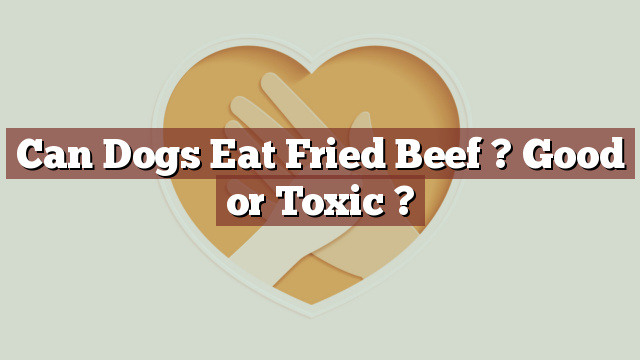Can Dogs Eat Fried Beef? Good or Toxic?
Knowing which foods are safe for your dogs is crucial for their overall health and well-being. As responsible pet owners, we are often curious about whether or not certain human foods are safe for our furry friends. One such food that may come to mind is fried beef. In this article, we will explore the nutritional value of fried beef for dogs, discuss its safety and potential toxicity, analyze the risks and benefits associated with feeding dogs fried beef, and provide guidance on what to do if your dog happens to consume fried beef.
Nutritional Value of Fried Beef for Dogs
Fried beef, like any other form of beef, is a rich source of protein. Protein is an essential nutrient for dogs as it supports muscle growth and development, aids in tissue repair, and contributes to a healthy coat and skin. Additionally, beef contains vitamins such as B12, B6, and niacin, which play a vital role in your dog’s overall health. However, it is important to note that fried beef may not retain all the nutritional benefits of its uncooked counterpart due to the frying process, which can degrade certain nutrients.
Can Dogs Eat Fried Beef? Safety and Toxicity
While dogs can technically eat fried beef, it is not recommended to make it a regular part of their diet. Fried foods, in general, can be high in fat and oil, which can lead to digestive issues such as pancreatitis or obesity in dogs. Furthermore, the frying process often involves the use of oils, spices, and breading, which can be harmful to dogs. Some spices and seasonings, like garlic and onion, are toxic to dogs and can cause gastrointestinal upset or damage to their red blood cells.
Potential Risks and Benefits of Feeding Dogs Fried Beef
Feeding dogs fried beef on occasion, as a special treat, may not pose significant risks. However, it is important to consider the potential health consequences associated with regular consumption. The high fat content of fried beef can lead to weight gain and obesity, which can contribute to various health issues such as joint problems and heart disease. Additionally, the use of oils, spices, and breading in the frying process may introduce ingredients that can be harmful to your dog’s health.
On the other hand, the protein content in fried beef can be beneficial for your dog’s muscle development and overall health. If you choose to offer your dog fried beef as an occasional treat, it is essential to ensure it is cooked without any harmful spices or seasonings and is served in moderation.
What to Do if Your Dog Eats Fried Beef
If your dog accidentally consumes fried beef, it is important to monitor them for any signs of digestive discomfort or adverse reactions. If your dog shows symptoms such as vomiting, diarrhea, or lethargy, it is recommended to seek veterinary advice. The vet can assess the situation and provide appropriate guidance or treatment if necessary. It is always better to be safe and consult a professional when in doubt.
Conclusion: Weighing the Risks and Making Informed Choices
In conclusion, while dogs technically can eat fried beef, it is not considered a safe or healthy option for regular consumption. The high fat content, potential for harmful spices or seasonings, and the frying process itself pose potential risks to your dog’s health. As responsible pet owners, it is crucial to make informed choices about our dogs’ diet and prioritize their well-being. When in doubt, consult your veterinarian for professional advice on suitable and safe food options for your beloved furry friend. Remember, a balanced and nutritious diet is key to a long and healthy life for your dog.
Thank you for investing your time in exploring [page_title] on Can-Eat.org. Our goal is to provide readers like you with thorough and reliable information about various dietary topics. Each article, including [page_title], stems from diligent research and a passion for understanding the nuances of our food choices. We believe that knowledge is a vital step towards making informed and healthy decisions. However, while "[page_title]" sheds light on its specific topic, it's crucial to remember that everyone's body reacts differently to foods and dietary changes. What might be beneficial for one person could have different effects on another. Before you consider integrating suggestions or insights from "[page_title]" into your diet, it's always wise to consult with a nutritionist or healthcare professional. Their specialized knowledge ensures that you're making choices best suited to your individual health needs. As you navigate [page_title], be mindful of potential allergies, intolerances, or unique dietary requirements you may have. No singular article can capture the vast diversity of human health, and individualized guidance is invaluable. The content provided in [page_title] serves as a general guide. It is not, by any means, a substitute for personalized medical or nutritional advice. Your health should always be the top priority, and professional guidance is the best path forward. In your journey towards a balanced and nutritious lifestyle, we hope that [page_title] serves as a helpful stepping stone. Remember, informed decisions lead to healthier outcomes. Thank you for trusting Can-Eat.org. Continue exploring, learning, and prioritizing your health. Cheers to a well-informed and healthier future!

